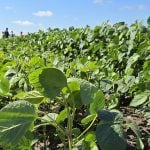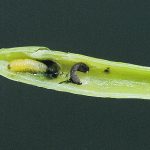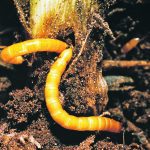Spider mite issues have been geographically limited but significant where they occur, said John Gavloski, an entomologist with Manitoba Agriculture.
Tag Archives John Gavloski

Spider mites big soybean problem this season
The dry conditions that have been seen in key growing areas of Manitoba have elevated the risk for growers

Pea leaf weevil spread prompts wider watch in Manitoba
Manitoba Agriculture to expand pea leaf weevil survey as the crop-damaging pest spreads to pulse crops farther east
Pea leaf weevils are creeping farther east in Manitoba.

Cabbage seedpod weevil pushes west
Glacier FarmMedia – The cool, damp spring the Prairies are experiencing could lead to a bad year for cabbage seedpod weevils, which is bad news for canola growers. “They seem to like it a little bit cooler, rather than very hot, and can suffer with great heat and very dry conditions,” Saskatchewan Agriculture entomologist James […] Read more

Wireworms remain persistent pest for producers
Nestled in the soil and hard to kill, this insect is a constant headache for growers across Western Canada
Glacier FarmMedia – They’ll survive things that would kill other crop pests. Some species will eat each other. If food is scarce, they might reverse molt to become smaller and harder to starve. They’ll go after grain crops, potatoes, onions, carrots, strawberries or almost any other field crop. Their tendency to feast on germinating seeds […] Read more
Canola council urges vigilance with flea beetles
Flea beetle damage was relatively low last year compared to the crushing pressure of previous seasons, but producers can’t afford complacency. “There was less foliar insecticide used for flea beetles than the previous years, and maybe less flea beetles to some degree, but there were still a lot of flea beetles out there,” said Manitoba […] Read more

System controls ’hoppers on pasture
Reduced Agent and Area Treatments method can cut insecticide use in half and still kill most grasshoppers
WINNIPEG — Grasshoppers, as their name suggests, hop from place to place in grassy fields. By taking advantage of that natural behaviour, University of Wyoming scientists have devised a way to control grasshoppers on pastures with a smaller volume of pesticides. The method is called Reduced Agent and Area Treatments (RAAT), in which farmers apply […] Read more


